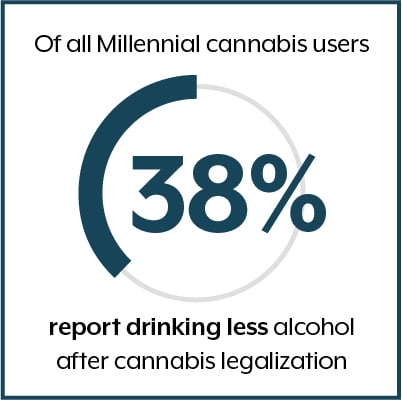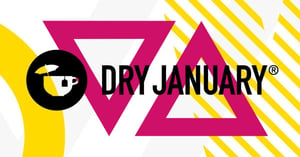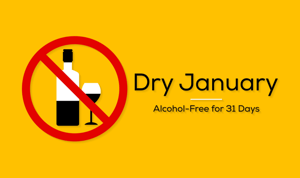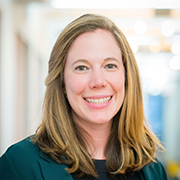The term “Cali sober” has been floating around since early 2019, when Michell Lhooq wrote an article for Vice about how she stopped drinking and using drugs, outside of cannabis and psychedelics. Since then many other people have used this term in describing their own journey in moving away from alcohol but continuing to use cannabis.
Young People are Drinking Less
While younger generations tend to be notorious for drugs and alcohol consumption, recent insights found that Gen Z consumers in the United States were drinking over 20% less per capita than millennials — who drank less than baby boomers and Gen Xers did at the same age. In our consumer data, we’ve found that 38% of Millennials report drinking less since the legalization of cannabis.

Source: Brightfield Group Consumer Insights
There are many factors driving this trend. Consumers are more health-conscious than ever before, which helps explain the popularity of hard seltzers (lower calorie, lower ABV, less sugar/carbs), but also why people may be cutting back on drinking. Sobriety has less stigma attached to it; many people participate in regular “sober periods” like Dry January or Sober October.


Many organizations support participation of Dry January for wellness and health (left: Awareness Days, right: Alcohol Awareness)
Younger consumers are going out drinking less and staying home more (the “joy of missing out”). They’re also more concerned about how they are perceived via social media; someone is always recording or filming and no one wants to look drunk on Instagram or Snapchat.
Explore cannabis insights from Gen Z to Baby Boomers
Anxiety is rampant, especially in younger consumers, who may cut back on alcohol to help with their mental health or to avoid “hangxiety” (the anxiety that often accompanies a bad hangover). And finally, there are more alternatives to drinking than ever before: kombucha, sparkling water, innovative non-alc spirits, and mocktails, as well as CBD water.
Can Cali Sober Make Cannabis Usage More Universal?
Cannabis plant consumption fits into more occasions and dayparts than alcohol can. Someone who drinks a beer in the morning might be a problematic drinker, but it is not uncommon for a cannabis user to light up before breakfast and right before going to bed. Cannabis doesn’t cause hangovers, and it is nearly impossible to consume a dangerous amount of it, unlike alcohol. Cannabis consumption is usually 0 calories or carbs, too (unless we’re talking about edibles).
Due to these perceived positive benefits (and likely many more), we saw an increase in consumers reporting “never or rarely drink alcohol” from Q1 to Q3 2020. In fact, nearly 60% of Millennials say they use cannabis more often than they drink alcohol.
There have been conflicting reports on how much of an impact these statistics have had on actual alcohol sales. But it does appear that there will be a significant impact in the long term as legalization spreads across the country, as more consumers turn 21 with access to legal cannabis, and as social acceptance increases.
In response, nearly all of the Big Beer firms have aligned with Canadian cannabis licensed producers (LPs) in recent years, to varying degrees of success. Many of these BevAlc giants are hard at work leveraging their consumer and market knowledge. They’re building brands and sales structures within the cannabis industry that would treat cannabis and beverage alcohol as sibling products while working to address usage occasions across the consumer landscape.
Cali sober is likely not just a passing fad, but a trend that could reshape the cannabis and beverage alcohol industries in the near future.
Get the latest on cannabis consumer trends and occasions
Updated Q4 2022



